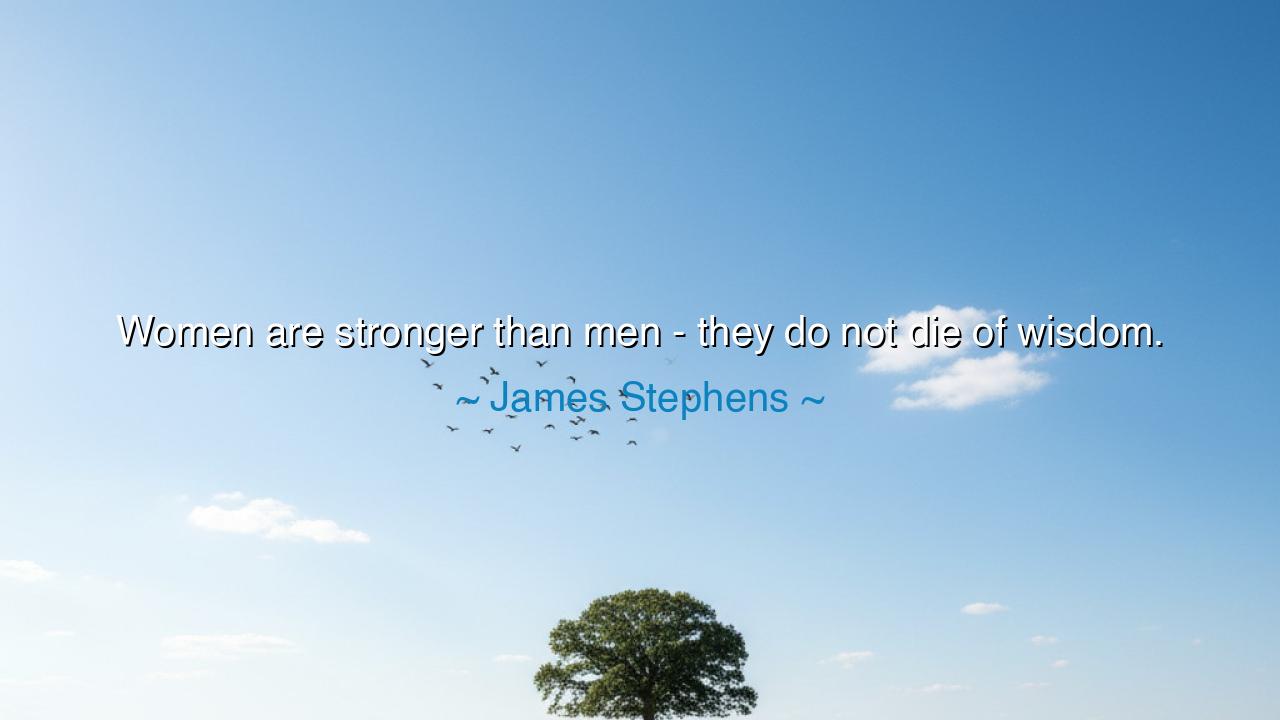
Women are stronger than men - they do not die of wisdom.






“Women are stronger than men - they do not die of wisdom.” These words from James Stephens speak to a profound truth about the resilience and enduring strength of women. Stephens suggests that the very quality which many see as a burden—wisdom—does not overwhelm or destroy women in the same way it can sometimes weigh heavily upon men. There is a power in the wisdom of women, a quiet strength that allows them to carry it without faltering, to thrive in its presence rather than be crushed by it. The phrase is a celebration of the unique endurance of women, whose wisdom, nurtured through centuries of experience, does not diminish their spirit but only deepens their ability to live fully and meaningfully.
The ancients saw wisdom as both a gift and a burden. In Greek philosophy, Socrates famously claimed that true wisdom lies in recognizing one's own ignorance, but this wisdom often came at a cost. The great philosopher Socrates himself was condemned to death for his pursuit of truth, and many others like him in ancient civilizations were silenced for challenging the status quo. Yet, in the case of women, Stephens is suggesting that they possess a unique fortitude that allows them to carry wisdom without the fear of being undone by it. Homer’s Penelope, the wife of Odysseus, is an emblem of this strength. She weathers years of separation, holding her household and her wisdom intact, never broken by the challenges she faces.
Consider the story of Cleopatra, the last pharaoh of Egypt, whose strength and intellect were legendary. She was not only a political strategist but also a scholar and philosopher, embodying the idea that wisdom does not destroy, but rather enhances the strength of a woman. Cleopatra navigated complex alliances and political intrigue, maintaining power and influence over a kingdom for years despite the dangers surrounding her. Her wisdom was her weapon, and it allowed her to thrive in a world dominated by men. Stephens’s quote finds its embodiment in her life — she did not die of wisdom, but rather, it was her wisdom that preserved her in the face of great adversity.
The resilience of women in the face of wisdom is also seen in the stories of Joan of Arc, the young French warrior and martyr. Joan, though a peasant girl, was infused with a deep wisdom and spiritual clarity that allowed her to lead the French army to critical victories during the Hundred Years' War. Her wisdom—an understanding of faith and destiny—empowered her to transcend her youth and gender, and she rose to heights of leadership that even men of her time could not imagine. Yet, despite her wisdom, she was betrayed and executed. Joan of Arc’s story resonates with Stephens's belief that women’s wisdom does not destroy them, but in fact, it often elevates them to greatness, even if the world fails to fully recognize it.
Stephens's quote also alludes to the idea that women, through their role as nurturers and keepers of wisdom in families and societies, bear a strength that is invisible yet immeasurable. Mothers, grandmothers, and daughters across time have held generations of knowledge and wisdom without succumbing to the pressures of the world around them. In every community, women are the silent architects of culture and society, carrying the weight of experience and wisdom with grace and resilience. Their wisdom does not lead them to despair or destruction but instead becomes a pillar upon which others can stand.
In conclusion, Stephens's words honor the timeless strength of women, who do not just endure wisdom, but thrive in it. Women, through their patience, resilience, and wisdom, have carried and shaped civilizations. Their wisdom, unlike the burden it sometimes becomes for men, fuels their inner power and purpose, allowing them to transform adversity into strength. It is a strength that continues to inspire and empower, transcending time and place, reminding us that true wisdom is not the cause of destruction, but the source of endurance and empowerment.






TVHau Tran Van
I’m intrigued by the suggestion that wisdom can be burdensome in different ways for men and women. Could it be highlighting psychological or emotional resilience rather than literal mortality? I also question whether the statement encourages respect for women’s capacities or subtly criticizes men’s approach to knowledge. How can we interpret such a claim in a way that appreciates gender strengths without perpetuating stereotypes?
TNThach Nguyen
This quote makes me think about humor as a tool for social commentary. Is the author exaggerating to make a point about gendered approaches to wisdom and endurance? I also wonder how modern perspectives on gender fluidity and equality interact with such statements. Does this idea still resonate in contemporary society, or is it primarily a reflection of historical attitudes?
THNguyen Thu Huyen
Reading this, I feel challenged to reflect on personal experiences. Have I seen situations where women demonstrated a unique ability to endure intellectual or emotional pressure compared to men? Could this observation be culturally conditioned, or is it a more universal truth? How do we balance admiration for such traits with avoiding sweeping generalizations about gender?
NNguyen
This perspective makes me curious about historical and literary contexts. Are there examples where women outlasted men in terms of resilience or insight, supporting this claim? It also raises questions about how society views the consequences of wisdom or knowledge. Could it imply that men are more prone to letting intellectual pride or rigid thinking harm them, while women navigate it differently?
PKPham Khue
I find this quote both humorous and thought-provoking. Could it be highlighting the idea that men often struggle under the weight of overthinking or pride, while women may integrate wisdom more gracefully? I also wonder whether such statements reinforce gender binaries or provide insight into lived experiences. Does acknowledging these differences risk oversimplifying complex human behavior?